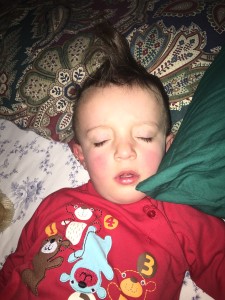
It’s 3 a.m., and I’m lying here in the dark, staring up at the ceiling. I’m sick and so exhausted that I’m not even sleepy anymore. My toddler, Carmen, half-sleeps across my neck, partially choking me, but I’m too afraid to wake him so I play opossum. It’s been a largely sleepless night for him so far, having awoken after only an hour and a half screaming for mommy.
Because this is uncharacteristic, I took him into bed with me to comfort him. But now, following hours of squirming in my arms, kicking my stomach, head-butting my face and crying his sad little tears, I can’t help but think to myself, “How did I let myself get here?” I’m better at crisis management than this.
- What in tarnation? Why was Carmen having such a tumultuous night? Could it have been the enormous amount of beans he had for dinner giving him stomach pains? Was he on a sugar-high caused by the M&Ms I gave him as a reward for eating such a good dinner? Does he have another molar coming in? Is his double ear infection inflamed once again?Toddlers aren’t able to articulate the problem. So it’s up to parents to use the right tools to figure it out—asking what hurts, taking his temperature, altering situational factors to see if a change provides relief. In a crisis situation, it’s up to us, as public relations practitioners, to not only listen to what our clients are saying but to listen with our “Spidey senses’ on high alert. We need to ask the right questions to get to the crux of the situation and determine the best course forward.
- That’s my story, and I’m sticking to it. A toddler needs reassurance—to hear that he’s going to be ok, that mommy is here, and that it’s time to go “night-night.” He needs to hear this often, in full and with complete certainty.In a crisis situation, consistent and strong key messaging is critical right out of the gate. It must be developed quickly, internalized by all spokespeople and disseminated across the media (if appropriate). Any cracks will be revealed, often painfully, for your client.
- Control, schmontrol. Just when I think Carmen has finally fallen asleep, he sits up straight and screams, “Mommy!” It’s an excruciating reminder that oftentimes a crisis situation is so volatile, shifts can be sudden and unexpected. And that as PR professionals, we need to be ready to re-assess the situation and recalibrate our course. Sometimes we work weekends or sleep only a few hours a night because a crisis requires our continuous attention. But, we’re in PR, and we thrive on trying to control the uncontrollable.
- Time-sharing. How does a 30-pound toddler manage to take up 85 percent of a double bed, leaving me to dangle over the edge? When we deal with a crisis situation in public relations, we are often taking resources away from other client work. It’s a calculated task for agency leaders to figure out how to continue servicing the firm’s other clients at a normal capacity when the folks working the crisis likely lead other accounts.
I may be drawing these parallels because it’s 3 a.m. and I’m delirious, or I may be on to something.
Great correlation. Concise and to the point.